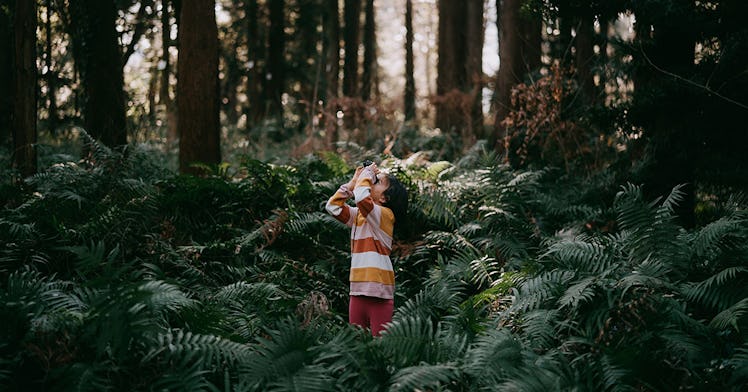Kids Who Spend Time in Nature May Have Fewer Behavioral Issues, Says Study
A new study finds that kids who spent more time than usual in nature had a significantly easier time dealing in the pandemic.

Is nature a miracle drug? Studies have shown that simple exposure to the outdoors can help alleviate negative impacts from ADHD, lessen asthma attacks, lower chances of obesity, and has positive impacts on many aspects of mental health. A new study adds to this body of work, showing that kids who had more exposure to nature during the pandemic also had significantly fewer behavioral issues.
Between April and July 2020, researchers surveyed over 300 parents in the United Kingdom with kids aged three to seven. They asked the parents whether their “child’s connection to nature has changed and why” and organized the responses into kids who spent more time in nature, less time in nature and about the same time in nature. Parents also completed a survey to examine the emotional and behavioral well-being of their children. They published their results this week in the journal People and Nature.
Overall, about 55 percent of parents reported that their kids were spending more time in nature, with 7 percent spending less time in nature and the rest noting no changes. But the researchers found that kids who increased time in nature had significantly fewer behavioral issues than kids who spent either less or the same amount of time in nature. They also found a significant difference in emotional issues between kids who spent less time in nature and kids who spent more time in nature, though not a statistically significant difference between kids who spent more and kids who spent about the same amount of time in nature.
The results were also stratified by economic status — kids in well-off families were more likely to have increase their time outside than kids in less well-off families. The authors note that these results line up with similar studies conducted among adults in the UK during the pandemic.
Families gave a lot of reasons and explanations surrounding changes to their child’s connection to nature. Comments ranged from observations that their kid had “become really interested in nature, animals and birds” to noting the child was “less inclined to choose to venture outside, preferring to stay indoors.” In addition, the study authors point out that many of the parents who reported no change in their child’s time spent outside during the pandemic suggested that their children were already very connected to nature.
There are a few limitations to this research. For one, the authors note, parents of kids with more behavioral and emotional issues might already be less inclined to take their kids out. In addition, while families included a mix of broad backgrounds, the authors also note that the study probably didn’t reflect all UK children, “particularly those living in very urban areas or in low socio-economic status situations.”
These findings are the latest in a growing field of scientific study documenting how nature can support our mental health, including in kids. For example, nature has been shown to lower stress and risk of anxiety or depression. But the authors of the new study point out specifically that these benefits can sometimes have trouble reaching everyone. They note that while some families maintained easy access to nature — such as having a garden — other families had more trouble getting outside, due things like travel restrictions and closed public green spaces.
Getting outside can be great for everyone, not just kids. If your family needs a mood boost this weekend, there are plenty of things you can do — from taking a hike to going birdwatching to just running around your backyard or nearest park.